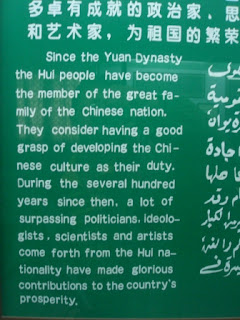
This week I spent exactly one day in Inner Mongolia (a northern province or more accurately "autonomous region" in China, not Mongolia the country), in a town called Bayan Hot (or 巴音 Bāyīn in Chinese). I live in a fairly remote city, but this really felt like heading out into the middle of absolute nowhere. It was a journey of close to three hours to the city, the last half of which being through pure, desolate desert with almost no signs of civilization. It's a small place that I knew little about besides it being in Inner Mongolia, the main inspiration for going.
Besides the slow pace of life and a chance to see Mongolian writing on all the signs, the town provided one of the ample opportunities to view the dichotomies and contradictions of modern China. Immediately outside the town limits, one can see the traditional clay and brick housing common in northwest China:

Mere streets away, inside the town, I was a little taken aback when I turned a corner and saw this modern monstrosity of a building:


This stadium could clearly hold the entire population of the town, and seemed a bit out of place, as well as ill-used. I asked a couple of locals and they said it was already closed for the winter but in the warmer months they hold art shows and the like. I've read that the provincial government is prone to flashy displays of development in lieu of more practical spending, and a 60,000 capacity stadium has been built in provincial capital Hohhot that with the exception of the opening celebrations is unlikely to fill up. In the near total-silence of this small town it felt a bit surreal to stand in front of it, like an apocalyptic future in which most of the population had been wiped out. Near total-silence is surreal in China anyway.
The main attraction of the town is a Mongolian temple, which was similar in style to others I've seen as many Mongolians practice Tibetan Buddhism. One monk who I guessed to be in his 30's had an obvious affinity for Westerners, and once he discovered I could speak Chinese quickly engaged me in conversation. This turned into a fast-paced and passionate 40 minute lecture about his thoughts on the society around him that fascinated me as much as it gave me a headache; he didn't pause much and I could only catch around 30% of what he said. The main idea was that he's become greatly disappointed in the loss of basic decency and morals that has accompanied fast economic growth. He thinks people in China are interested in money, success, and the approval of others at the cost of everything else. Though he said there are still decent, honest Chinese people around, the whole society is promoting economic success as the be-all and end-all of life, and it's wrong. He also is disappointed in the attitude towards Mongolians like himself; he told me they are seen as stupid, slow and uncouth by many Chinese, and they aren't truly understood. It's true that almost every time ethnic minorities come up during conversation with a Han Chinese friend they have used the word 野蛮 yěmán, which means "barbarous" or "uncivilized" and have made several disparaging remarks (generally students, who also claim during class that there is no discrimination in China). This disillusionment with society inspired him to become a monk two years ago. He hoped I would learn Mongolian and travel to Mongolia proper someday, an idea I've toyed with anyway (the traveling part at least).

I've noticed a pattern of minorities opening up to foreigners in China, whether it was Uyghurs in Xinjiang or Tibetans in Qinghai. I suppose complaints to Han Chinese would often fall on indifferent or even hostile ears (I've heard comments like "those minorities, always complaining; they have it good enough") and we provide a fresh and interested source of conversation that is outside the system. The Chinese tourists walking past us during my talk with the monk paid little attention, the only exceptions being a student who giggled and wanted to ask me where I was from, and a woman who interrupted to ask the monk if she could take pictures. I think images of Confucian scholars and Tang poetry had given me the impression of the Chinese as quite thoughtful and spiritual, which wasn't necessarily on the mark. Whatever other virtues modern Chinese society has I wouldn't put deep spirituality at the top of the list, and famous temples are pure tourist attractions with guys in their new cowboy hats taking pictures of their girlfriend while she gives the "V" sign and smiles (more on that soon).
After leaving the monk I took a bus back to Yinchuan, and on the way out saw this billboard:
发展是第一要务
富民是第一目标
和谐是第一任务
roughly translated:
Development is the #1 duty
Enriching the people is the #1 goal
Harmony is the #1 mission
























